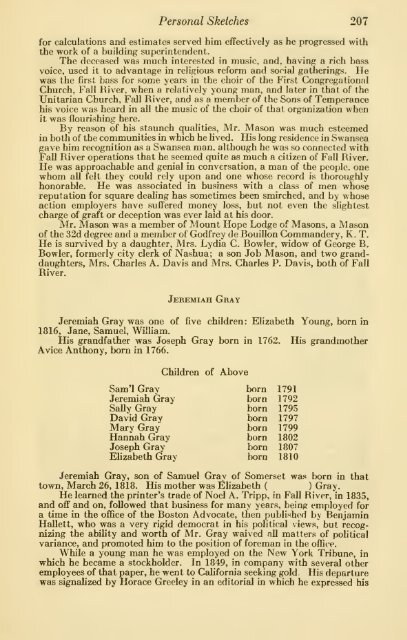History of Swansea, Massachusetts, 1667-1917; - citizen hylbom blog
History of Swansea, Massachusetts, 1667-1917; - citizen hylbom blog
History of Swansea, Massachusetts, 1667-1917; - citizen hylbom blog
Create successful ePaper yourself
Turn your PDF publications into a flip-book with our unique Google optimized e-Paper software.
Personal Sketches 207<br />
for calculations and estimates served him effectively as he progressed with<br />
the work <strong>of</strong> a building superintendent.<br />
The deceased was much interested in music, and, having a rich bass<br />
voice, used it to advantage in religious reform and social gatherings. He<br />
was the first bass for some years in the choir <strong>of</strong> the First Congregational<br />
Church, Fall River, when a relatively young man, and later in that <strong>of</strong> the<br />
Unitarian Church, Fall River, and as a member <strong>of</strong> the Sons <strong>of</strong> Temperance<br />
his voice was heard in all the music <strong>of</strong> the choir <strong>of</strong> that organization when<br />
it was flourishing here.<br />
By reason <strong>of</strong> his staunch qualities, Mr. Mason was much esteemed<br />
in both <strong>of</strong> the communities in which he lived. His long residence in <strong>Swansea</strong><br />
gave him recognition as a <strong>Swansea</strong> man, although he was so connected with<br />
Fall River operations that he seemed quite as much a <strong>citizen</strong> <strong>of</strong> Fall River.<br />
He was approachable and genial in conversation, a man <strong>of</strong> the people, one<br />
whom all felt they could rely upon and one whose record is thoroughly<br />
honorable. He was associated in business with a class <strong>of</strong> men whose<br />
reputation for square dealing has sometimes been smirched, and by whose<br />
action employers have suffered money loss, but not even the slightest<br />
charge <strong>of</strong> graft or deception was ever laid at his door.<br />
Mr. Mason was a member <strong>of</strong> Mount Hope Lodge <strong>of</strong> Masons, a Mason<br />
<strong>of</strong> the 32d degree and a member <strong>of</strong> Godfrey de Bouillon Commandery, K. T.<br />
He is survived by a daughter, Mrs. Lydia C. Bowler, widow <strong>of</strong> George B.<br />
Bowler, formerly city clerk <strong>of</strong> Nashua; a son Job Mason, and two granddaughters,<br />
Mrs. Charles A. Davis and Mrs. Charles P. Davis, both <strong>of</strong> Fall<br />
River.<br />
Jeremiah Gray<br />
Jeremiah Gray was one <strong>of</strong> five children: Elizabeth Young, born in<br />
1816, Jane, Samuel, William.<br />
His grandfather was Joseph Gray born in 1762. His grandmother<br />
Avice Anthony, born in 1766.<br />
Children <strong>of</strong> Above<br />
Sam'l Gray born 1791<br />
Jeremiah Gray born 1 792<br />
Sally Gray born 1795<br />
David Gray born 1797<br />
Mary Gray born 1799<br />
Hannah Gray born 1802<br />
Joseph Gray born 1807<br />
Elizabeth Gray born 1810<br />
Jeremiah Gray, son <strong>of</strong> Samuel Gray <strong>of</strong> Somerset was born in that<br />
town, March 26, 1818. His mother was Elizabeth ( ) Gray.<br />
He learned the printer's trade <strong>of</strong> Noel A. Tripp, in Fall River, in 1835,<br />
and <strong>of</strong>f and on, followed that business for many years, being employed for<br />
a time in the <strong>of</strong>fice <strong>of</strong> the Boston Advocate, then published by Benjamin<br />
Hallett, who was a very rigid democrat in his political views, but recognizing<br />
the abihty and worth <strong>of</strong> Mr. Gray waived all matters <strong>of</strong> political<br />
variance, and promoted him to the position <strong>of</strong> foreman in the <strong>of</strong>fice.<br />
While a young man he was employed on the New York Tribune, in<br />
which he became a stockholder. In 1849, in company with several other<br />
employees <strong>of</strong> that paper, he went to California seeking gold. His departure<br />
was signalized by Horace Greeley in an editorial in which he expressed his

















